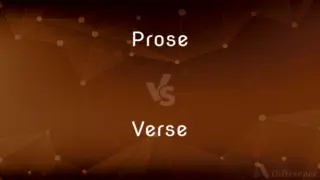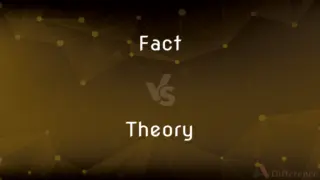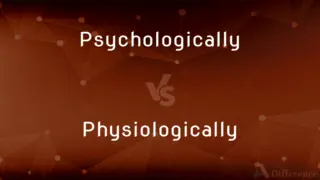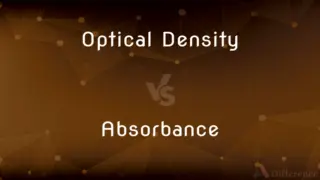Theorem vs. Postulate — What's the Difference?
Edited by Tayyaba Rehman — By Fiza Rafique — Updated on November 2, 2023
A theorem is a statement proven on the basis of previously established statements, whereas a postulate is assumed true without proof.

Difference Between Theorem and Postulate
Table of Contents
ADVERTISEMENT
Key Differences
A theorem is a proposition that has been or needs to be proven true through a structured logical process based on deductive reasoning. Postulates are taken to be self-evident; they are assumed as a basis for logical reasoning and are not proven.
Theorems are the building blocks of formal logic and mathematics, each one a conclusion reached through proof. Postulates are the foundation of geometric reasoning, serving as starting points for deducing other truths without requiring proof.
The Pythagorean theorem is a classic example of a theorem—it can be proven using a variety of methods based on other established theorems and axioms. Euclid’s postulates, on the other hand, are accepted without proof and used to derive further geometric principles.
The validity of a theorem rests on the soundness of its proof. The acceptance of a postulate lies in its necessity and self-evidence for a system of thought, like the parallel postulate in geometry, which simply states that through a point not on a given line, there is exactly one line parallel to the given line.
In essence, theorems and postulates are different types of statements in the landscape of mathematical logic: theorems demand proof, postulates do not.
ADVERTISEMENT
Comparison Chart
Definition
A proven statement in a logical system.
An assumed statement used without proof.
Basis
Result of a proof.
Considered self-evident.
Role in Mathematics
Conclusions derived from axioms and previously proven theorems.
Starting points for logical reasoning.
Example
Pythagorean theorem.
Euclidean postulates.
Requirement
Requires demonstration through logical deduction.
Requires no proof, but acceptance for further reasoning.
Compare with Definitions
Theorem
A rule or law, especially one expressed by an equation or formula.
The binomial theorem expands algebraic expressions.
Postulate
A statement that is taken to be true, to serve as a premise or starting point for further reasoning.
His postulate of a flat universe was critical to his cosmological model.
Theorem
A statement or proposition that is proven by argument.
The fundamental theorem of calculus connects differentiation and integration.
Postulate
A fundamental principle or assumption that is accepted without proof.
Euclid's fifth postulate led to the development of non-Euclidean geometries.
Theorem
A theoretical proposition that follows logically from established facts.
Her theorem on asymmetric encryption revolutionized cybersecurity.
Postulate
To assume the existence or truth of something as a basis of discussion.
Scientists postulated the existence of dark matter due to gravitational effects.
Theorem
A general proposition in mathematics that is demonstrably true or is assumed to be so.
Fermat's Last Theorem was a puzzle for centuries.
Postulate
A foundational element of a logical or mathematical system that is not questioned.
The postulate of equal rights for all is central to her legal argument.
Theorem
In logic, a formula that can be derived from the axioms of a formal system.
Gödel's incompleteness theorem challenged foundational mathematics.
Postulate
Suggest or assume the existence, fact, or truth of (something) as a basis for reasoning, discussion, or belief
She postulated that the environmentalists might have a case
His theory postulated a rotatory movement for hurricanes
Theorem
In mathematics and logic, a theorem is a non-self-evident statement that has been proven to be true, either on the basis of generally accepted statements such as axioms or on the basis of previously established statements such as other theorems. A theorem is hence a logical consequence of the axioms, with a proof of the theorem being a logical argument which establishes its truth through the inference rules of a deductive system.
Postulate
(in ecclesiastical law) nominate or elect (someone) to an ecclesiastical office subject to the sanction of a higher authority
The chapter was then allowed to postulate the bishop of Bath
Theorem
An idea that has been demonstrated as true or is assumed to be so demonstrable.
Postulate
A thing suggested or assumed as true as the basis for reasoning, discussion, or belief
Perhaps the postulate of Babylonian influence on Greek astronomy is incorrect
Theorem
(Mathematics) A proposition that has been or is to be proved on the basis of explicit assumptions.
Postulate
To assume or assert the truth, reality, or necessity of, especially as a basis of an argument
"We can see individuals, but we can't see providence.
We have to postulate it" (Aldous Huxley).
Theorem
(mathematics) A mathematical statement of some importance that has been proven to be true. Minor theorems are often called propositions. Theorems which are not very interesting in themselves but are an essential part of a bigger theorem's proof are called lemmas.
Postulate
To propose as a hypothesis or explanation
Researchers now postulate that the disease is caused by a virus.
Theorem
A mathematical statement that is expected to be true
Fermat's Last Theorem'' was known thus long before it was proved in the 1990s.
Postulate
To assume as a premise or axiom; take for granted.
Theorem
(logic) A syntactically correct expression that is deducible from the given axioms of a deductive system.
Postulate
(Archaic) To make claim for; demand.
Theorem
(transitive) To formulate into a theorem.
Postulate
Something assumed without proof as being self-evident or generally accepted, especially when used as a basis for an argument
"the postulate that there is little moral difference between the superpowers" (Henry A. Kissinger).
Theorem
That which is considered and established as a principle; hence, sometimes, a rule.
Not theories, but theorems ( ), the intelligible products of contemplation, intellectual objects in the mind, and of and for the mind exclusively.
By the theorems,Which your polite and terser gallants practice,I re-refine the court, and civilizeTheir barbarous natures.
Postulate
A fundamental element; a basic principle.
Theorem
A statement of a principle to be demonstrated.
Postulate
(Mathematics) An axiom.
Theorem
To formulate into a theorem.
Postulate
(Archaic) A requirement; a prerequisite.
Theorem
A proposition deducible from basic postulates
Postulate
Something assumed without proof as being self-evident or generally accepted, especially when used as a basis for an argument. Sometimes distinguished from axioms as being relevant to a particular science or context, rather than universally true, and following from other axioms rather than being an absolute assumption.
Theorem
An idea accepted as a demonstrable truth
Postulate
A fundamental element; a basic principle.
Postulate
(logic) An axiom.
Postulate
A requirement; a prerequisite.
Postulate
Postulated.
Postulate
To assume as a truthful or accurate premise or axiom, especially as a basis of an argument.
Postulate
To appoint or request one's appointment to an ecclesiastical office.
Postulate
To request, demand or claim for oneself.
Postulate
Something demanded or asserted; especially, a position or supposition assumed without proof, or one which is considered as self-evident; a truth to which assent may be demanded or challenged, without argument or evidence.
Postulate
The enunciation of a self-evident problem, in distinction from an axiom, which is the enunciation of a self-evident theorem.
The distinction between a postulate and an axiom lies in this, - that the latter is admitted to be self-evident, while the former may be agreed upon between two reasoners, and admitted by both, but not as proposition which it would be impossible to deny.
Postulate
Postulated.
Postulate
To beg, or assume without proof; as, to postulate conclusions.
Postulate
To take without express consent; to assume.
The Byzantine emperors appear to have . . . postulated a sort of paramount supremacy over this nation.
Postulate
To invite earnestly; to solicit.
Postulate
(logic) a proposition that is accepted as true in order to provide a basis for logical reasoning
Postulate
Maintain or assert;
He contended that Communism had no future
Postulate
Take as a given; assume as a postulate or axiom;
He posited three basic laws of nature
Postulate
Require as useful, just, or proper;
It takes nerve to do what she did
Success usually requires hard work
This job asks a lot of patience and skill
This position demands a lot of personal sacrifice
This dinner calls for a spectacular dessert
This intervention does not postulates a patient's consent
Postulate
To assume or suggest something as a basis for reasoning or argument.
To solve the problem, she postulated a new theory.
Common Curiosities
What is a theorem?
A theorem is a statement in mathematics or logic that has been proven based on previously established statements, axioms, or postulates.
What is a postulate?
A postulate is a statement that is assumed to be true without proof and is used as a foundation for further reasoning.
Are postulates only used in geometry?
While commonly used in geometry, postulates are also fundamental in other areas of mathematics and logic.
Is every mathematical statement a theorem?
No, not all mathematical statements are theorems; some are postulates, axioms, or conjectures.
Can a theorem become a postulate?
No, a theorem cannot become a postulate because theorems require proof and postulates do not.
Are axioms and postulates the same?
Axioms and postulates are similar in that they are both accepted without proof, but axioms are generally more broadly applicable across different branches of mathematics.
Why are theorems important?
Theorems are important because they expand our understanding of mathematical relationships and logical structures.
How do postulates affect theorems?
Postulates serve as the starting assumptions from which theorems are derived; they shape the scope and nature of theorems that can be proven.
Can a postulate be rejected?
A postulate can be rejected if it leads to contradictions or does not align with the logical structure of the mathematical system.
How do mathematicians decide what to accept as a postulate?
Mathematicians accept statements as postulates if they are seemingly self-evident and if they provide a useful foundation for building a logical framework.
What happens if a theorem is disproven?
If a theorem is disproven, it means there was an error in the proof, and it must be re-evaluated or discarded.
Can a postulate be proven?
Postulates are not proven as they are the foundational assumptions upon which proofs are built.
How is a theorem proven?
A theorem is proven through a logical sequence of statements that follow from accepted axioms, postulates, and previously proven theorems.
Do theorems have practical applications?
Many theorems have practical applications in fields such as physics, engineering, computer science, and economics.
How many postulates can a mathematical system have?
A mathematical system can have any number of postulates, but they must be consistent and not lead to contradictions within the system.
Share Your Discovery

Previous Comparison
Prose vs. Verse
Next Comparison
Fact vs. TheoryAuthor Spotlight
Written by
Fiza RafiqueFiza Rafique is a skilled content writer at AskDifference.com, where she meticulously refines and enhances written pieces. Drawing from her vast editorial expertise, Fiza ensures clarity, accuracy, and precision in every article. Passionate about language, she continually seeks to elevate the quality of content for readers worldwide.
Edited by
Tayyaba RehmanTayyaba Rehman is a distinguished writer, currently serving as a primary contributor to askdifference.com. As a researcher in semantics and etymology, Tayyaba's passion for the complexity of languages and their distinctions has found a perfect home on the platform. Tayyaba delves into the intricacies of language, distinguishing between commonly confused words and phrases, thereby providing clarity for readers worldwide.















































